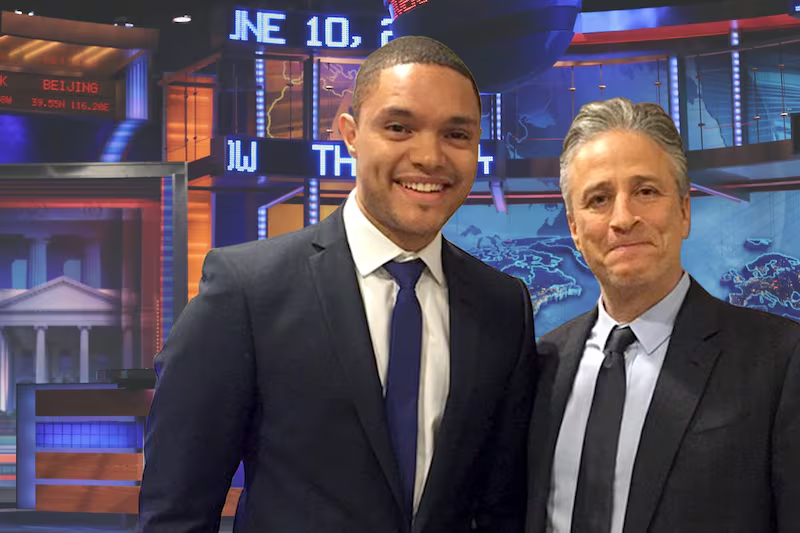So let’s get this out of the way: Like the majority of the American public, I didn’t really know who Trevor Noah was before the bombshell announcement that he was the anointed successor to Jon Stewart’s epic run as host of The Daily Show. Like the majority of viewers of color, I was pumped that Comedy Central now had two black hosts back-to-back, Noah and Larry Wilmore, in two of the most coveted timeslots on TV, the ones vacated by Stewart and fellow legend Stephen Colbert.
And like pretty much 99 percent of the Twitter-using public, I cringed, groaned and otherwise reacted with visible and audible disappointment to the “bad tweets” that surfaced within 24 hours of the announcement.
The tweets weren’t funny to begin with—tired old hacky stand-up material we’ve all heard before—jokes about rich Jews, beer goggles, etc. They were also hacky in the way that’s given stand-up a bad reputation of lashing out at easy, low-hanging targets whose lives are hard enough without constantly being the butt of bullying humor.
(For the record, the joke that made me roll my eyes the hardest was one that doesn’t seem included in most people’s lists of his offensive tweets—a random flippant remark directed at the gender identity of Caster Semaya, an identity she has gone through hell to defend. I remain amazed that anyone who knows her story could slap at her so casually and brazenly.)
I totally sympathize with anyone who feels like those tweets have cooled them off on Noah—especially since Noah has only sorta-kinda apologized since then.
But, as people have said over and over and over again, let whoever has not had a “bad tweet” dug up on them and then reacted badly when asked to suddenly defend themselves in a highly public forum cast the first stone.
Lately a lot of people have been talking about “callout culture” and its flaws and side effects, especially in the wake of Jon Ronson’s book So You’ve Been Publicly Shamed, describing the forest fire-like nature of online outrage.
Trevor Noah doesn’t quite fit the model of Ronson’s book—he’s not a random civilian suddenly and involuntarily thrust into the spotlight, he’s a professional entertainer taking a seat in one of the most prestigious chairs in media—Jon Stewart’s chair, which may, in fact, confer a greater moral authority with my generation than Brian Williams’s ever could. It’s reasonable to hold him to a high standard.
But there does seem to be something pathological about the public holding him up to the standard of six or seven tweets without having ever watched a full stand-up special of his or seen him write in long-form. And, as with the case Ronson brings up where a single tasteless snapshot makes a single individual a totemic stand-in for all the suffering and disrespect America’s veterans suffer at the hands of the public, it seems foolish to start a massive national conversation about one comedian’s insensitivity as though he exists in a vacuum.
Look—as many have pointed out, Noah’s tweets aren’t remarkably or unusually offensive. They’re fairly typical jokes, and certainly were even more typical four or five years ago than today—which should be a positive sign that things are, indeed, changing.
The fact that this kind of thing is all too typical in comedy doesn’t excuse it, any more than the fact that minstrel shows or screaming homophobic rants were once culturally normal excuses way back when. Indeed, as far as the flippant transphobia goes, if you make an effort to realize that trans people exist in real life and not just as the butt of jokes it gets really hard to watch even “progressive” comedians like Stephen Fry or Stephen Colbert make jokes about trans women as “traps” and not think about how that attitude gets trans women murdered every day.
But it does mean that Twitter inquisitions against individual comedians are something of a waste of time. It means that we’re now acting like the only relevant question is whether Trevor Noah, specifically, is anti-Semitic or sexist or transphobic as though he’s the only person in history to ever make such jokes, and if we root him out then our culture will revert to a pristine, innocent state of not being culpable for anything.
We get to look at Noah’s tweets—his, yes, shitty, unfunny, bigoted tweets—and because we, in this moment, look at them and say for sure we would never tweet a joke about how Jewish girls don’t give head or Caster Semaya isn’t a woman, we’re better than he is. Just like we all got to ritually denounce Donald Sterling as the one person we could all agree was The Real Racist.
Never mind that seeing these tweets is the result of people doing a thorough, diligent search of Noah’s social media history, and the vast majority of us have never endured such scrunity—nor has anyone tape-recorded the rest of us to try to catch us at our worst.
I’m not saying this in order to give Noah a pass, but to question the implicit pass everyone else gets when someone like Noah catches the spotlight. Coming down hard on Lindsey Stone felt like it was, symbolically, coming down against all insensitivity and disrespect to our veterans, but really it was giving most of that insensitivity and disrespect a pass.
I can attest, as a former D.C. tour guide, to tons of incredibly disrespectful photo ops being taken all the time at sacred national landmarks. 99.9999 percent of those people did not get called out, shamed, fired, or ostracized for it. I’m willing to bet several of them forgot they ever did it, then turned around and joined in piling on Lindsey Stone when she went viral in order to bolster their confidence that they were among the “good guys.”
Just like all you have to do is turn on a random Comedy Central special to hear stuff exactly as bad as Noah’s bad tweets, and all you have to do is go to a local open mic to hear shit so foul it makes those tweets seem like sweet poetry. The people going on about how Noah’s tainted online presence will tarnish Jon Stewart’s legacy forget that Jon Stewart’s Daily Show traded in the same kind of nasty humor and Stewart refused to apologize for it. They forget that “progressive icon” and current HBO talk show host Bill Maher says way more heinous shit all the time but since he’s already branded himself as “controversial” it doesn’t go viral, because we already expect it of him.

I don’t see this backlash as problematic because I see the issue as no big deal, as some Noah apologists do. I see it as problematic because I see it as too big a deal to be funneled into putting just one guy on trial and giving the rest of the culture a pass—because “scapegoating,” in the classic sense of the term, is all about heaping symbolic abuse on a symbolic target to avoid having to actually change anything about ourselves.
And much as I hate to say it, as someone who owes any media career I have to my accidental success building a platform on Twitter, I think Twitter may be to blame here. Sure, this happens on other platforms, but the vast majority of the time these backlashes happen to tweets and themselves take the form of tweets. Indeed, my own backlash to the backlash was a tweet talking about how the “reportage” of this story, like so many other social media stories, is just a string of tweets from random people who come up in a search.
There’s much I disagree with Slate’s David Auerbach Keller on, but I have to agree with him that Twitter kind of sucks in a lot of ways, ways that are inextricably linked to the things that also make it fun and addictive and popular. I once wrote a tongue-in-cheek blog post trying to characterize different social media platforms as analogous to physical spaces—the guarded intimacy of Facebook like Thanksgiving dinner, the chintzy fakeness of Google Plus like a college orientation party, the cravenly utilitarian nature of LinkedIn like a business “networking function.”
Of all the platforms I’ve used, Twitter feels the most like a real party—one where you actually have the opportunity to meet new, interesting people (instead of the incestuous network of college buddies and distant relatives Facebook tends to be) over spontaneous conversation.
...And that’s the problem. It’s like a real cocktail party with real conversations, except it’s a cocktail party where people are constantly following you around with cameras and any one of your spontaneous conversations might suddenly go viral—which is bad enough when it happens to tech magnates and presidential candidates going on unscripted rants at actual parties, but many times worse when it’s a 140-character-long snippet with no context you randomly typed on your phone that suddenly gets preserved as an epigraph for the ages.
All it takes is one of your old tweets going viral for Twitter to transform from a real-time conversation into a courtroom dissection, where a dialogue, a defense, or even a wholesale apology comes to seem pointless because the real-time conversation is gone—no one’s even listening to you anymore, they’re just linking the old tweet and adding their pile-on comments to it again and again and again. Critics of the left like to claim this is a peculiar habit of Internet “social justice warriors,” but as someone who’s been retweeted out of context by #GamerGate countless times I can attest to reactionary right-wing trolls being the black belt masters of Internet pile-ons, or as Wondermark has indelibly dubbed the practice, “sealioning.” And, indeed, while a great deal of sincere criticism has been aimed at Noah by progressives, Fox News et al have been gleefully adding fuel to the flames, eager to see the left eat itself.
I’m not saying that the tweets don’t reveal nasty things about Noah’s character and that it’s unjustified to call him out and ask him to reconsider his attitudes. But if you actually care about the specific issue of who hosts The Daily Show, then putting Noah’s tweets on blast and endlessly dissecting them prevents any meaningful dialogue with Noah—it isn’t even helpful as a starting point to search for a possible replacement for Noah, since “Someone who didn’t make those specific tweets” isn’t much of a criterion.
And if the goal is to start a broader conversation about toxicity in our culture, it’s even less helpful, since every single one of us—including the right-wing ideologues at Fox News—can proudly wear our “Someone who didn’t make those specific tweets” Good Person badges and collect favs and RTs for it.
I think Noah has handled the situation badly; I think the right move would’ve been to apologize right away, as is usually the case in such situations. But I also think it’s understandable for someone to get shell-shocked and react badly, even a veteran comedian, when five-year-old tweets you may not even remember making suddenly resurface, presented to the court as evidence of your character.
The urge to scapegoat—to pick one image, one sound bite, one clip as a symbol of everything that’s bad and then to gain absolution for yourself by rejecting and denouncing that one thing—will probably always be with us.
But maybe we should be asking whether the tools we create to communicate act to enable or curb those worst impulses, and whether there’s anything we can do to make Internet culture more useful for discussion and self-reflection, as opposed to a culture that thinks it can eliminate bigotry by knocking down celebrity bigots one by one.






